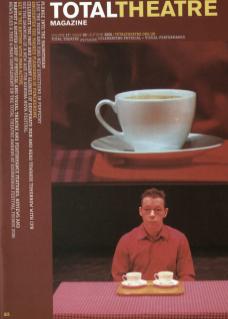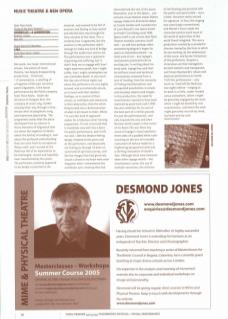One week, two major international venues, two pieces of music theatre, two deeply disappointing productions. Chronicles - A Lamentation, a retelling of a fragment of the epic narrative poem Gilgamesh, is the latest performance by the Polish company Teatr Pieśń Kozła. Under the direction of Grzegorz Bral, the company of seven sing, tumble and play their way through a forty-minute whirl of polyphonic song and impressive physicality. The programme states that the piece developed from an interest in those elements of Gilgamesh that are about the negation of death, about the futility of evading it, and about the profound understanding that can arise from its acceptance. Meaty stuff, and I arrived at the Barbican full of an expectation to be challenged, moved and hopefully even transformed by this piece. The performers certainly appeared to be deeply connected to the material, and seemed to be full of emotion and feeling as they wailed and whirled their way through the forty minutes of the show. This is certainly how it appeared, but the emotion in the performers didn't manage to make any kind of bridge through the auditorium and to me. This performance was a spectacle of grieving and suffering, but it didn't help me to engage with how I might experience grief, how I might suffer, how I might contemplate my own inevitable death. It very much felt like one of those nights out where the performers are very highly trained, and so technically secure, so in touch with their darkest feelings, so in control of their voices, so confident and impressive in their physicality, that the whole thing turned into a demonstration of what it all meant to them. Whilst I'm sure this kind of approach makes for a fabulous actor training programme, I'm not convinced that it translates very well into a basis for public performance, and it left me cold. I left the theatre feeling deeply irritated at the piece and at the performers, and absolutely not feeling as through I'd been on some kind of spiritual journey, and the few images that had genuinely struck a chord in my heart were soon forgotten when I remembered the overblown over-emoting that had characterised the rest of the piece.
Meanwhile, over at the Opera... pre-eminent visual theatre maker Robert Lepage makes his directorial debut at Covent Garden with a production of Lorin Maazel's new opera based on Orwell's terrifying novel 1984. Opera itself is not a form that Total Theatre normally concerns itself with – an odd fact perhaps when remembering Wagner's hopes for opera as Gesamtkunstwerk – as total work of art – but Lepage's involvement promised to be an exciting one. In writing about his early work, Lepage has said that his brilliant visual and technical inventiveness stemmed from a lack of funding, from the necessity of finding transformations and unexpected possibilities in simple and everyday objects and images. In this production, the need for inventiveness seemed to have been replaced by good hard cash (1984 has won notoriety for its cost of the best part of a million pounds for just ten performances), and only towards the very end when Winston Smith cowers in the corner of his Room 101 was there any sense of Lepage's visual aesthetic: three sides of a padded white cube revolving on the arm of a terrible instrument of torture made for a frightening perspectival shift and a thrilling realisation of Smith's fear. Although there were moments when other Lepage motifs – the simultaneous scene, the use of multiple narratives, the collision of the fleeting and personal with the public and permissible – were visible, the piece rarely carried his signature. In fact, the staging was surprisingly conventional, and Maazel's music made the characterisations much more of the world of opera than of the world Orwell imagined. This was a production created by a wonderful director limited by the form in which he was working, by the weaknesses of the score, and by the limitations of the performers. Despite a miraculous set that managed to be both metallic and transparent, and Simon Keenlyside's robust and physical performance as Smith, I left this performance – very much as I had left the Barbican two nights before – longing to be back in a little, under-funded venue somewhere, where I might be genuinely engaged by the work, where I might be dazzled by real inventiveness, and where the work might genuinely nourish my mind, my heart and my soul.

